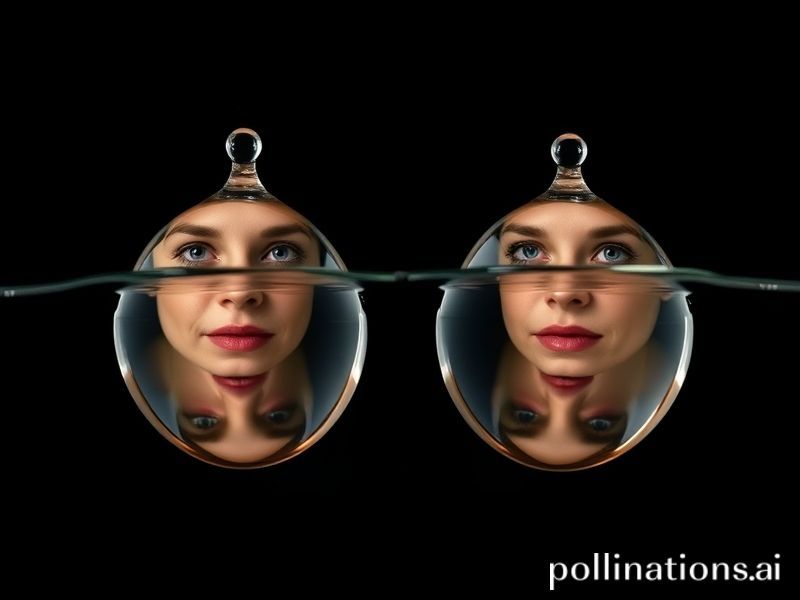Spitting Image Goes Global: How Your Face Became the World’s Most Counterfeited Currency
GENEVA—The phrase “spitting image” used to be quaint, the sort of thing British grandmothers muttered while pinching a child’s cheek and declaring him the exact replica of some long-dead sea captain. Today, the expression has gone global, industrial-grade, and—because nothing good ever stays local—weaponised. From Lagos to Lausanne, the human face is now a mass-produced commodity, copyright optional.
Consider the numbers: 72 percent of all smartphone photos taken in 2023 include a human face, according to an EU privacy watchdog that counted them while pretending to be horrified. Simultaneously, deepfake generators in 114 countries now offer “spitting-image” avatars for the price of a decent sandwich. The implication is elegantly grim: never before has humanity been so precisely duplicated while remaining so fundamentally misunderstood.
In China, the Ministry of Public Security runs a “One Person, One File” program that cross-references every CCTV frame with childhood portraits scraped from social-media accounts—because authoritarian efficiency is just nostalgia with better servers. Meanwhile, in the United States, Hollywood agencies license deceased actors’ likenesses so that Humphrey Bogart can sell you craft beer from beyond the grave. The corpse, it turns out, is the ultimate influencer.
Europe, never one to miss a moral panic it can tax, has drafted the AI Liability Directive, which will fine companies up to 6 percent of global turnover if their algorithmic doppelgänger gives someone an “emotional injury.” Lawyers in Brussels are already practising the phrase “facial defamation” with the same reverence monks once reserved for Latin. Somewhere in Silicon Valley, a product manager is updating the terms of service to redefine “emotion” as an optional premium feature.
The global south, as always, provides both raw material and punchline. Nairobi start-ups rent Kenyan faces to Western tech firms so that driverless cars can learn not to mow down pedestrians who don’t look like the engineers who built them. The gig economy has literally become a face gig: upload your smile, collect micro-payments, hope the algorithm doesn’t decide you resemble a wanted criminal in Jakarta. If that sounds dystopian, remember that Uber once paid drivers in sandwiches—progress is incremental.
Diplomacy, too, has surrendered to the mirror. At last month’s U.N. Security Council session on “Synthetic Identity Threats,” the French delegate complained that a deepfake of President Macron had attempted to sell discounted nuclear reactors on Telegram. Russia responded that its own deepfake of Macron was “clearly labelled satire,” which in U.N.-speak translates to “prove it, loser.” Everyone agreed the episode was regrettable, adjourned for lunch, and quietly licensed the tech for next year’s election cycles.
The cultural layer is where the joke gets truly bleak. Japanese VTubers—animated influencers operated by anonymous humans—now earn more than the country’s entry-level astronauts, a metric that says everything about late capitalism and nothing good. In Brazil, evangelical pastors use AI-rendered doubles of themselves to preach in 40 congregations simultaneously, proving that bilocation is finally achievable so long as you don’t mind the soul staying behind.
And yet, amid the replication, something stubbornly human persists. Refugees separated by borders hold up childhood photographs to Zoom cameras, insisting, “This is still me.” Their claim is less legal than metaphysical: identity as memory, not megapixel. The border guard’s facial-recognition kiosk, of course, disagrees. The mismatch triggers an alert, a secondary screening, another line to stand in. Bureaucracy, like death, remains undefeated.
Ultimately, the international triumph of the “spitting image” reveals the same punchline technology always delivers: we can now copy anything except the thing that matters. The pixels are perfect; the soul is still buffering. Until the upgrade drops, enjoy your new face—terms and conditions apply, batteries not included, resale value negligible after the first scandal.







